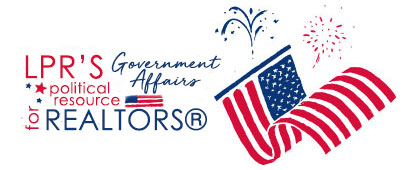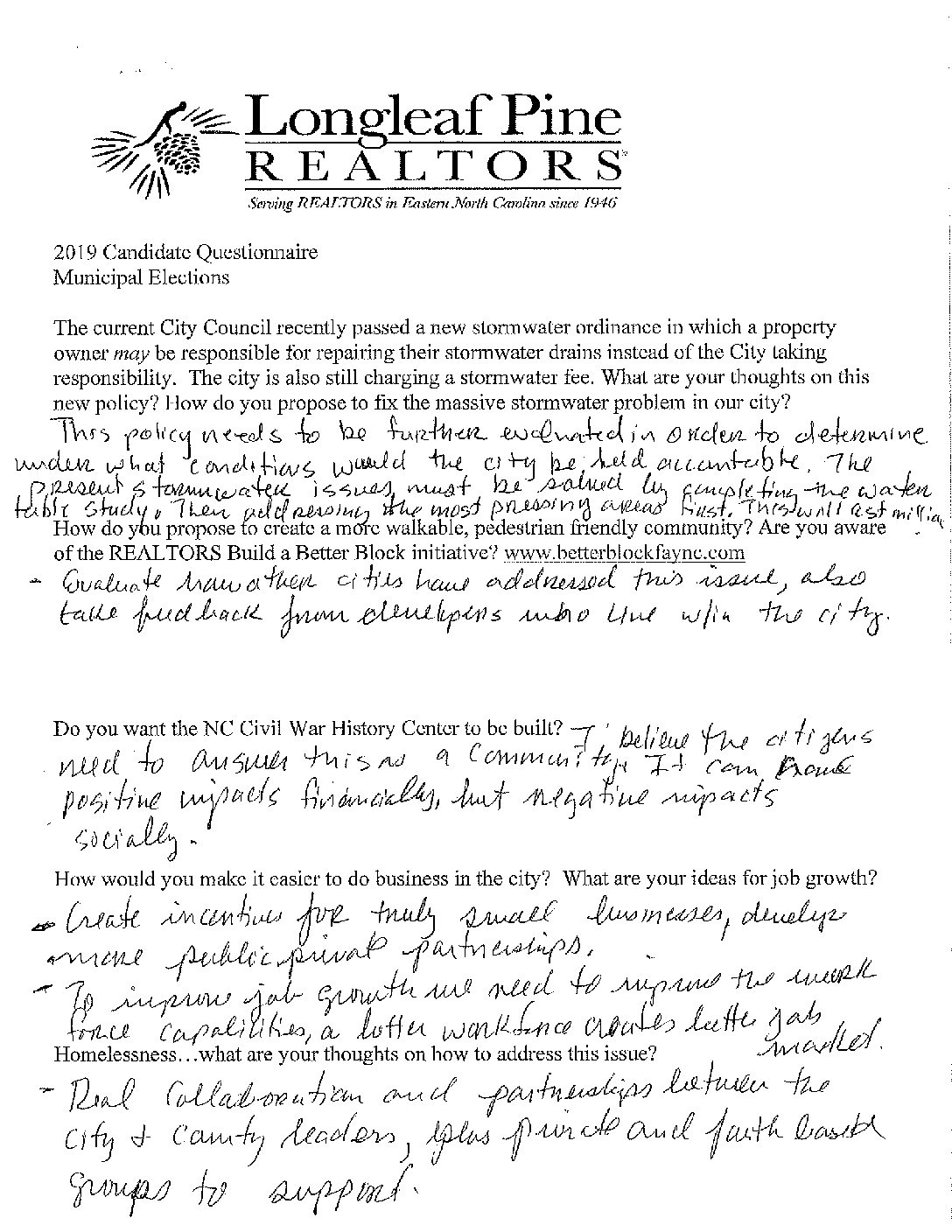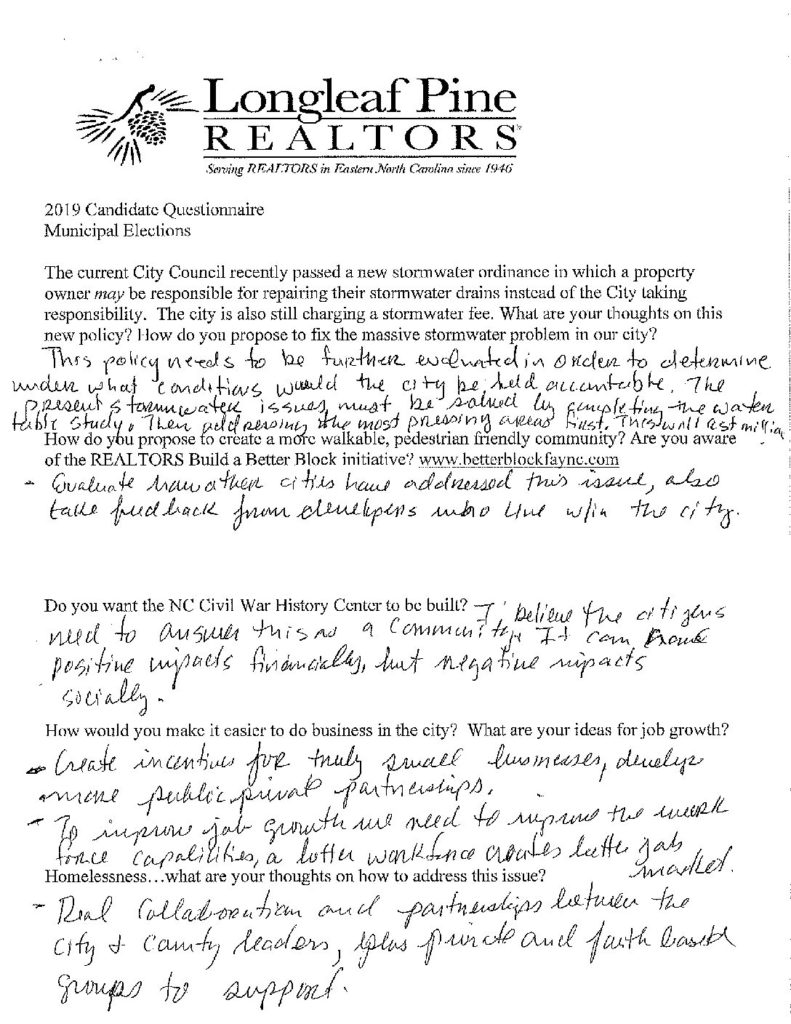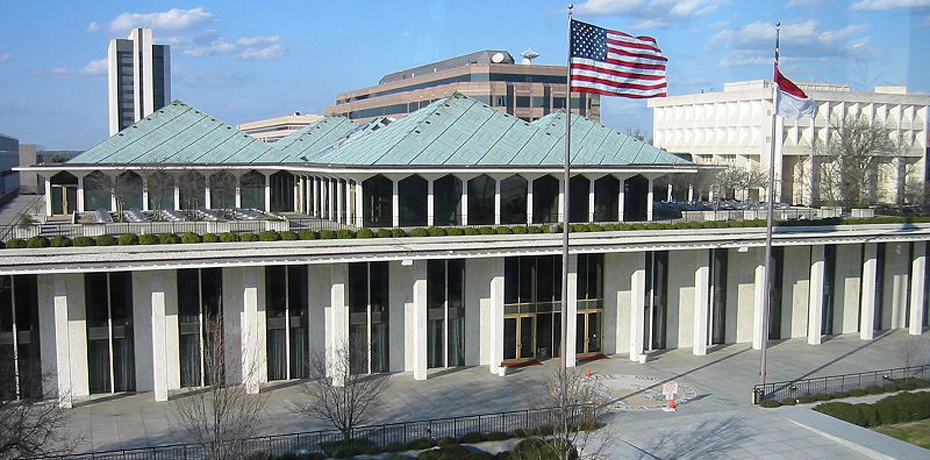Longleaf Pine Realtors 2019 Candidate Questionnaire
Municipal Elections.
Candidates Full Name: James (Jim) William Arp, Jr.
Daytime Phone: 910.728.2569
e-mail: jarp@ci.fay.nc.us
Current Occupation: City Council Member, District 9, City of Fayetteville; Department of the Army Civilian
Previously Elected Position: City Council Member, District 9, City of Fayetteville; Mayor Pro Tem.
Community Involvement: Church (Youth Group Leader, Small Group Leader, Men’s Ministry), Youth Sports Coach, Terry Sanford Baseball (announcer, music, social media, and broadcasting of games), Fayetteville Beautiful, and others.
Community Endorsements: Multiple organizations to include the Realtors and Homebuilders over the years.
Do you have an active campaign: Yes
Do you accept PAC Checks: Yes
Question 1: Stormwater ordinance.
Answer: The city has an unequivocal responsibility for stormwater requirements within the City’s right-of-way. These cost projections are still unclear, as the city does not have accurate surveys completed of all the watershed areas, though some of them are underway.
1. To fix this massive problem we have to clearly identify the problem. This includes a full spectrum assessment and approach from legacy stormwater issues to future stormwater requirements. The City needs to prioritize its watershed study effort in a data driven approach based on areas that are most impacted (frequency and severity of flooding – impacts to homes and businesses).
2. To have an immediate benefit, the City needs to execute a stormwater plan/installation for those areas where we can achieve the greatest impact based on current data and surveys using the Stormwater Fund balance. I am not an advocate for the City to continue to charge a fee and carry a large fund balance when there is and should be work accomplished to address some of these issues now.
3. To address the overall stormwater problem within the City, I support a voter-approved stormwater and public infrastructure bond to address the cost of repairs and new construction, which clearly will exceed the capacity of the City’s annual budget.
4. I support the Drainage Assistance Program, which will evaluate service requests for off right-of-way drainage projects based on a standardized eligibility criteria. Projects found to meet the criteria will be prioritized and provided to the Stormwater Advisory Board (SWAB) for review and approval on an annual basis. Upon approval, projects will be designed and constructed as part of the existing stormwater project management process.
Question 2: Walkability
I am an active walker in our City and support creating more walkable, pedestrian friendly opportunities for our community and support the Realtors’ Build a Better Block initiative (loved the event in Haymont). Here are two initiatives I would like to see the City pursue:
1. Establish a “River Walk” pedestrian walk/bike way from the MLK Park along the Cross Creek all the way to the Botanical Garden (through Veteran’s Park, Festival Park, Linear Park) in lieu of a Cape Fear River Walk in the parks and recreation bond.
The river floods excessively and is not as an attractive water feature as Cross Creek. A Cross Creek “River Walk” could leverage existing City efforts for walkability, current parks and improvements, Segra Stadium, and create an area for a more bicycle and pedestrian friendly use that would connect with the existing Cape Fear River Trail. Additionally, with good planning and zoning, we can create residential and business opportunities along the walkway with single family, multi-family, retail, and entrepreneurship zones (nodes). We need to implement the Fayetteville Downtown Urban Design Plan (01.23.2019)
a. Improve Mobility and Streetscapes: Promote a well connected and beautiful downtown by improving walkability and bikeability, managing parking, and enhancing streetscapes and public spaces
b. Enhance Parks and Trail Connections: Improve stormwater management and public spaces (trails and parks) to address the growing impacts of flooding
c. Stimulate Ballpark area Investment: Leverage the Fayetteville Ballpark and neighboring investments by transforming the City Hall block into a mixed use sport and entertainment destination
d. Create a Downtown District: Create a Downtown District by expanding the Hay Street experience to Russell Street
e. Improve Downtown’s Gateways: Establish downtown’s identity at its gateways, and carry it through the Downtown District area
f. Foster Downtown Living: Promote residential development zoning to create a downtown neighborhood with diverse housing options
g. Strategically Locate Cultural Venues: Establish the parameters for locating a Per- forming Arts Center that maximizes its contribution to downtown’s vitality
2. We need to implement components of the Fayetteville Downtown Urban Design Plan (01.23.2019) across other areas of the City (hospital, greater Cross Creek Mall, Ramsey Street and other areas) to:
a. Improve Mobility and Streetscapes: Promote a well-connected and beautiful city by improving walkability and bikeability, managing parking, and enhancing streets- capes and public spaces
b. Enhance Parks and Trail Connections: Improve stormwater management and public spaces (trails and parks) to address the growing impacts of flooding
c. Create bikeways that support the ability of cyclists to transit to and from work to include Fort Bragg.
Question 3: Civil War Museum
Yes – I support this economic development initiative. If all parties (State of NC, Cumberland County and the NCCWHC 501 (c) (3) provide their funding as committed to the project, the City should fund its portion. “We are products of our past, but we don’t have to be prisoners of it.” ― Rick Warren, The Purpose Driven Life
We need to learn from our past.
Question 4. Homelessness.
This is a growing problem across our nation in spite of a booming economy and one that is growing in Fayetteville. I believe there are a lot of compassionate people in Fayetteville, I count myself among them, who too often seek to treat the symptoms of homelessness and not the real problem. For to long our policies have been misguided and instead have enabled them to thrive in unsafe and unsound conditions. Allowing these vulnerable citizens to live unsheltered on our streets (in places not intended for human habitation, such as sidewalks, parks, forested areas, cars, abandoned buildings, doorsteps to businesses, and even the Police Department) is unacceptable. We need to promote and take actions that require the homeless to seek appropriate shelter and resources that will enable them to get off the street and back to a life of normalcy.
While safe and appropriate shelter is a component for some, the biggest component is addressing substance abuse disorders, untreated mental illness, or unintended consequences from well intentioned policies. Improved policies that address the underlying causes of the problem and more effectively serve some of the most vulnerable members of society are needed now. I support the City’s participation in policy solutions, but financing of these solutions must be addressed through the State of N.C. and Cumberland County.
The City should support their lead with appropriate policy (they are taxpayer resourced for Health and Human Services). We should also continue to support non-profits and churches in their efforts to assist the homeless and to help them get appropriate care and treatment so they can get back on their feet. The long-term goal is not to house people indefinitely; it is to get them reintegrated back into a healthy and productive life where they are self-sufficient.






